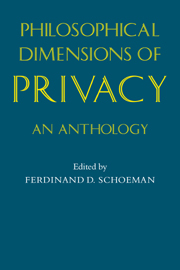Book contents
- Frontmatter
- Contents
- List of contributors
- Preface
- 1 Privacy: philosophical dimensions of the literature
- 2 Social distance and the veil
- 3 The origins of modern claims to privacy
- 4 The right to privacy [the implicit made explicit]
- 5 Privacy [a legal analysis]
- 6 Privacy as an aspect of human dignity: an answer to Dean Prosser
- 7 Privacy [a moral analysis]
- 8 Privacy, freedom, and respect for persons
- 9 Privacy and self-incrimination
- 10 Intimacy and privacy
- 11 The right to privacy
- 12 Why privacy is important
- 13 Privacy, intimacy, and personhood
- 14 Privacy: some arguments and assumptions
- 15 An economic theory of privacy
- 16 Privacy and the limits of law
- 17 Privacy and intimate information
- Selected bibliography
- Index of names
16 - Privacy and the limits of law
Published online by Cambridge University Press: 12 December 2009
- Frontmatter
- Contents
- List of contributors
- Preface
- 1 Privacy: philosophical dimensions of the literature
- 2 Social distance and the veil
- 3 The origins of modern claims to privacy
- 4 The right to privacy [the implicit made explicit]
- 5 Privacy [a legal analysis]
- 6 Privacy as an aspect of human dignity: an answer to Dean Prosser
- 7 Privacy [a moral analysis]
- 8 Privacy, freedom, and respect for persons
- 9 Privacy and self-incrimination
- 10 Intimacy and privacy
- 11 The right to privacy
- 12 Why privacy is important
- 13 Privacy, intimacy, and personhood
- 14 Privacy: some arguments and assumptions
- 15 An economic theory of privacy
- 16 Privacy and the limits of law
- 17 Privacy and intimate information
- Selected bibliography
- Index of names
Summary
Anyone who studies the law of privacy today may well feel a sense of uneasiness. On one hand, there are popular demands for increased protection of privacy, discussions of new threats to privacy, and an intensified interest in the relationship between privacy and other values, such as liberty, autonomy, and mental health. These demands have generated a variety of legal responses. Most states recognize a cause of action for invasions of privacy. The Supreme Court has declared a constitutional right to privacy, a right broad enough to protect abortion and the use of contraceptives. Congress enacted the Privacy Act of 1974 after long hearings and debate. These activities seem to imply a wide consensus concerning the distinctness and importance of privacy.
On the other hand, much of the scholarly literature on privacy is written in quite a different spirit. Commentators have argued that privacy rhetoric is misleading: when we study the cases in which the law (or our moral intuitions) suggest that a “right to privacy” has been violated, we always find that some other interest has been involved. Consequently, they argue, our understanding of privacy will be improved if we disregard the rhetoric, look behind the decisions, and identify the real interests protected. When we do so, they continue, we can readily see why privacy itself is never protected: to the extent that there is something distinct about claims for privacy, they are either indications of hypersensitivity or an unjustified wish to manipulate and defraud.
- Type
- Chapter
- Information
- Philosophical Dimensions of PrivacyAn Anthology, pp. 346 - 402Publisher: Cambridge University PressPrint publication year: 1984
- 31
- Cited by



